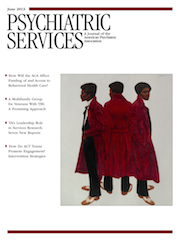IOM Committee Assesses Current and Long-Term Needs of Returning Service Members and Veterans
More than 2.2 million men and women have served in the wars in Iraq and Afghanistan. Although most have readjusted well to postdeployment life, a large proportion (44%) have reported difficulties resuming home life, reconnecting with family members, finding employment, and returning to school. To better understand and address the needs of these individuals, Congress requested the National Academies to undertake a comprehensive assessment of the physical, psychological, social, and economic effects of deployment on service members and their families and communities and identify gaps in care.
The result—Returning Home From Iraq and Afghanistan: Assessment of Readjustment Needs of Veterans, Service Members, and Their Families—was recently published by the Institute of Medicine (IOM). The 794-page report includes several new recommendations for the Department of Defense (DoD) and the Department of Veterans Affairs (VA) and reiterates a 2010 call for the VA to conduct annual forecasts of the types and amounts of resources necessary to meet the needs of veterans and their families over the next 30 years, when demand for health care and disability compensation is likely to peak, according to trends from previous wars.
Other recommendations address key findings of the 29-member committee of experts who conducted the assessment and drafted the report. The assessment found that many individuals return with multiple complex health conditions that will present lifelong challenges and hinder readjustment. Systemwide challenges in the VA and DoD prevent those who need treatment from receiving it. Military families often endure adverse consequences of deployments—health effects, family violence, and economic burdens. Although numerous programs exist to respond to the needs of returning service members and veterans, there is little evidence regarding their effectiveness. Unemployment and underemployment are acute problems for veterans. DoD, VA, and other federal agencies have data that can help address many current problems, but numerous barriers to data sharing and linking data must be overcome.
The report emphasizes two areas: the need for DoD and VA to address the increasing diversity of this population and the need to eliminate military sexual trauma. Nontraditional families are becoming increasingly common, but support services have largely focused on married, heterosexual couples and their children. The VA and DoD should support programs that address the full range of families, including unmarried partners, same-sex couples, single parents, and stepfamilies. In addition, the DoD should implement a zero-tolerance approach to military sexual trauma; formal performance appraisal and promotion systems should include specific evaluation criteria on how well military leaders address the issue.
The committee found that in many ways DoD and VA clinicians are at the forefront of providing evidence-based care for brain injuries and mental disorders. However, the assessment uncovered shortfalls. The committee voiced serious concerns about inadequate clinical follow-up and low rates of delivery of evidence-based treatments, particularly psychotherapies to treat posttraumatic stress disorder and depression and pharmacotherapies for substance use disorders. In some areas, VA and DoD policies are not aligned with the evidence base, according to the report. Clear evidence is lacking to support the effectiveness of the Automated Neuropsychological Assessment Metrics, an instrument used by DoD to assess cognitive function after a head injury. VA has included “acceptance and commitment therapy” for depression in its national rollout of evidence-based treatments, but there is not sufficient evidence to support its use as a first-line intervention. With respect to suicide prevention, DoD policy prohibits restricting access to privately owned weapons for individuals at risk, even though research has shown that such restriction prevents suicides.
The report is available on the IOM Web site at www.iom.edu.



